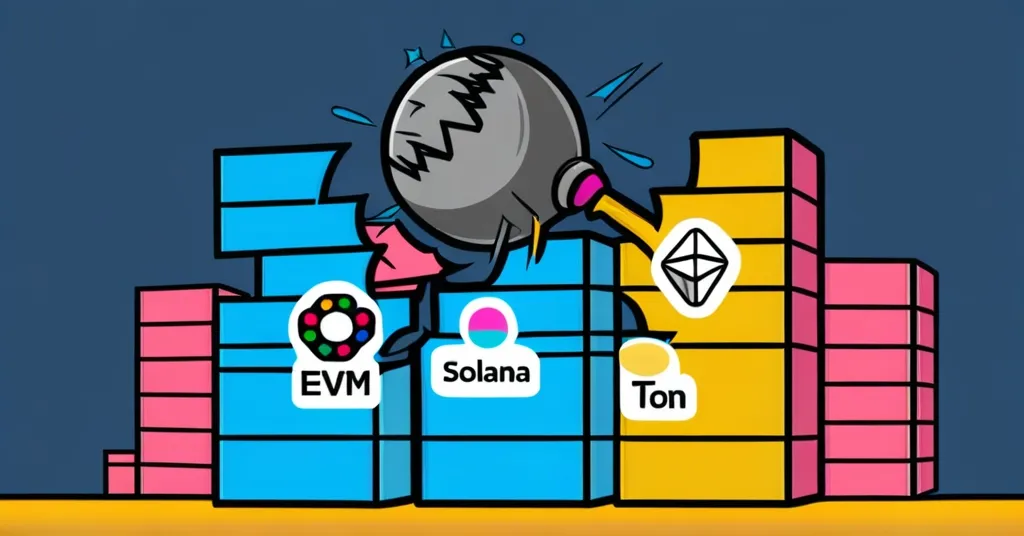Analog Raises $5M to Boost Blockchain Interoperability: Eyes on Solana and TON

Analog Secures $5M to Break Blockchain Barriers
Analog, pushing the boundaries of blockchain interoperability, has just raised another $5 million, bringing its total funding to a hefty $21 million. This round saw support from heavy hitters like Tribe Capital, Balaji Srinivasan, Wintermute, and Mask Network, along with newcomers such as Foresight Ventures, Gate Ventures, BackerDAO, and Black Label Ventures. The goal? To further refine its General Message Passing (GMP) protocol and bolster developer tools, aiming to make cross-chain interactions as smooth as butter and boost web3 data accessibility.
- Analog raises $5M, total funding now at $21M
- Backed by Tribe Capital, Balaji Srinivasan, Wintermute, Mask Network, and more
- Focus on enhancing General Message Passing (GMP) protocol and developer tools
- SDK supports EVM and Polkadot, eyes on Solana and TON integration
- Collaborations with Rarible, Zenswap, Meson Network
- Over 50 projects leveraging Analog’s tech
- Testnet sees 345,000 accounts
- Zenswap facilitates cross-chain asset swaps
Analog’s ambitious drive is to dismantle the isolated silos of blockchain networks, much like a digital wrecking ball. With the GMP protocol at its heart, the company enables developers to build omnichain decentralized applications (dapps) that can traverse multiple blockchain ecosystems seamlessly. This is crucial in a world where fragmentation is the bane of web3’s existence. The SDK, already a friend to EVM and Polkadot chains, is set to welcome Solana and TON, broadening its reach and utility.
The company’s partnerships with Rarible, Zenswap, and Meson Network aren’t just for show. They’re strategic moves that solidify Analog’s role in the blockchain infrastructure and amplify its network’s capabilities. With over 50 projects currently tapping into Analog’s protocol, and a testnet that’s already attracted a whopping 345,000 accounts, the stage is set for the mainnet launch, which occurred last month. The token launch is scheduled for February 6, 2025, marking another milestone in Analog’s journey.
The GMP protocol is the backbone of Analog’s offerings, enabling features like omnichain DEX trading, NFT minting, and liquidity aggregation. These aren’t just buzzwords but real solutions to real problems in the DeFi space. Zenswap, Analog’s decentralized exchange, takes this a step further by not only allowing cross-chain asset swaps across networks like TON, Solana, and Bitcoin but also aiming for a trading volume of $1 billion per week within a year. It’s like giving your crypto assets a passport to travel freely across different blockchains.
Despite the excitement, it’s vital to keep our feet on the ground. The blockchain world is notorious for its hype cycles, and while interoperability is a critical need, executing such ambitious projects isn’t without its technical challenges and regulatory hurdles. As bitcoin maximalists, we recognize the role of altcoins and other blockchains in pushing the envelope, but we must also advocate for a cautious approach. These innovations should serve the decentralized ethos, not just chase the next big thing.
Analog’s vision aligns with the principles of decentralization and effective accelerationism (e/acc), aiming to disrupt the status quo and drive the adoption of blockchain technology. Yet, we must watch how these developments impact the broader crypto landscape, including the potential for increased centralization if not carefully managed. It’s a tightrope walk between pushing forward and maintaining the integrity of the decentralized revolution.
Thad Luckinbill from Black Label Ventures calls Analog’s proof-of-time mechanism a “paradigm shift” that merges scalability with security, positioning it at the forefront of decentralization and distributed networks. Victor Young, Analog’s co-founder, emphasizes their edge in a comprehensive developer toolkit that eliminates the need for external oracles or intermediaries, enhancing the security and efficiency of cross-chain applications.
Analog isn’t alone in this race. Competitors like LayerZero Labs, Axelar, and Hyperlane are also vying for dominance in the interoperability space. While this competition can spur innovation, it also highlights the need for Analog to keep executing on its promises.
The future of cross-chain dapps hangs in the balance, and Analog’s success could very well be the tipping point that brings us closer to a truly interconnected blockchain world. But as we watch this unfold, we must remain vigilant about the challenges ahead, ensuring that the push for interoperability doesn’t come at the cost of security or decentralization.
Key Questions and Takeaways
What is the main goal of Analog?
Analog aims to enhance blockchain interoperability by streamlining cross-chain interactions and improving web3 data accessibility.
How much funding has Analog raised in total?
Analog has raised a total of $21 million in funding.
Who are some of the major investors in Analog’s latest funding round?
Major investors include Tribe Capital, Balaji Srinivasan, Wintermute, Mask Network, Foresight Ventures, Gate Ventures, BackerDAO, and Black Label Ventures.
What will Analog use the newly raised funds for?
The funds will be used to advance the General Message Passing (GMP) protocol and developer tools to enable seamless omnichain decentralized applications (dapps).
Which blockchains does Analog’s SDK currently support?
Analog’s SDK currently supports EVM and Polkadot chains, with plans to integrate Solana and TON.
What are some of the features enabled by Analog’s GMP protocol?
The GMP protocol enables features such as omnichain DEX trading, NFT minting, and liquidity aggregation.
How does Zenswap contribute to Analog’s mission?
Zenswap, Analog’s decentralized exchange, facilitates cross-chain asset swaps across networks like TON, Solana, and Bitcoin, using USDC-based liquidity routing, which aligns with Analog’s goal of enhancing blockchain interoperability.
What is the current status of Analog’s network development?
Analog has over 50 projects building on its protocol, and its testnet has attracted 345,000 accounts. The mainnet was launched last month, and the token launch is scheduled for February 6, 2025.
What is the significance of Analog’s partnerships?
Partnerships with entities like Rarible, Zenswap, and Meson Network solidify Analog’s position as a key player in blockchain infrastructure, enhancing its network and capabilities.
How does Analog’s approach aim to impact the decentralized economy?
By eliminating blockchain silos and fostering multi-chain ecosystems, Analog’s developer-friendly approach aims to onboard more developers, institutions, and users into the decentralized economy, making it more efficient and accessible.



